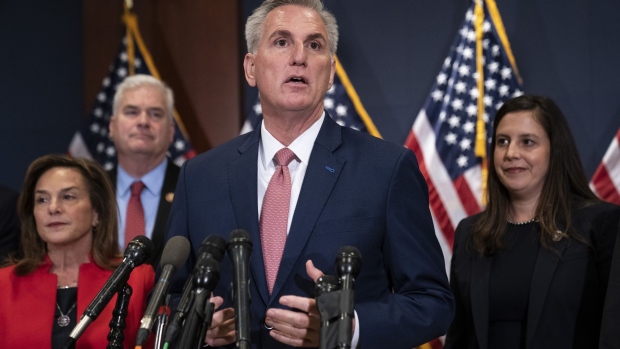Nov 17, 2022
Republicans Pledge to Give Ukraine Aid Tough Scrutiny With House Control
, Bloomberg News

(Bloomberg) -- Republican lawmakers vowed Thursday to give more scrutiny to financial support for Ukraine once they take control of the House of Representatives in January, risking a showdown with the Biden administration and raising questions about the long-term US commitment as the war drags on.
Representatives Marjorie Taylor Greene of Georgia, Thomas Massie of Kentucky and other proponents of cutting aid to Ukraine demanded in a news conference that an inspector general be appointed to examine how money for Ukraine had been spent so far, saying Americans wouldn’t continue to support President Volodymyr Zelenskiy without asking tough questions.
“It’s high time to stop sending any more money -- don’t send another penny to Ukraine,” Massie said. Greene said the US could have already secured its southern border using the money sent to Ukraine “but we’re not doing that.”
While Greene and Massie are unlikely to get their wish to halt all funding, such demands will add to pressure on Republican leaders and create headaches for the Biden administration, which has put a focus on unity among western allies to keep money and weapons flowing to Zelenskiy’s military.
President Joe Biden asked Congress this week for $37.7 billion in new aid to Ukraine, and Democrats are expected to try to supply that in a $1.7 trillion annual funding bill next month.
While Biden will still have some ways to work around recalcitrant lawmakers after Republicans take over the House in January, their demands will make allies uneasy.
House Minority leader Kevin McCarthy, who’s set to become speaker, said last month that Republicans aren’t going to write a “blank check” for Ukraine, especially given rising inflation at home. The US has contributed about $18 billion in security assistance and weapons since Russia invaded Ukraine in February.
With ballots in a few races still being counted, the party gained the bare 218 seats needed for control on Wednesday night. The narrowness of the Republican majority means that Greene, Massie and others seeking to cut funding to Ukraine may have leverage, making life more complicated for those Republicans who want to keep the aid flowing.
Greene said she wasn’t threatening to withhold support for McCarthy as the next House speaker over the issue. She said she planned to introduce a resolution to force the Biden administration to turn over internal documents and communications with the goal of uncovering where the Ukraine funding has gone. Democrats sank similar requests in the past.
Greene and her allies also said they are demanding that GOP leaders hold stand-alone votes next year on Ukraine aid rather than including it as part of spending packages.
Biden will have other Republicans on his side, including Representative Michael McCaul, who’s set to take control of the House Foreign Affairs Committee. In the Senate, where Democrats will retain a narrow majority, Republican Leader Mitch McConnell has said his party wants to send Ukraine more assistance, not less.
Qualms about the scale of support for Ukraine also may resurface from the left of the Democratic Party. In October, a letter from a group of 30 progressive House Democrats urged Biden to pursue negotiations with Russia to bring about a diplomatic end to the war in Ukraine. Within hours, after criticism from other Democrats, they backpedaled and affirmed support for Biden’s strategy.
‘Not Worried’
In an interview with Bloomberg News, Ukraine’s economy minister, Yulia Svyrydenko said she believed the US would keep up financial support for its fight against Russia regardless of who’s in control.
“We really appreciate your bipartisan support,” she said. “We’re not worried. Ukraine fights for very concrete rights and values. I think the US will support until we get victory.”
The divisions about Ukraine highlight broader shifts in sentiment about national security among Republicans.
Once known as the more hawkish party, many Republicans under President Donald Trump tried to dial back US commitments overseas, seeking to remove US troops from Syria and Somalia and expressing skepticism about international institutions such as the European Union. Trump even threatened to withdraw the US from NATO.
GOP lawmakers also have concerns about corruption in Ukraine, particularly given acknowledgments that the US embassy in the country lacks the resources to track the funds disbursed to Kyiv.
Partly in response to those concerns, the State Department announced a plan in late October to make sure weapons systems intended for Ukraine aren’t diverted. That push involved bolstering security for US-provided weapons at storage and transfer points.
--With assistance from Erik Wasson.
©2022 Bloomberg L.P.